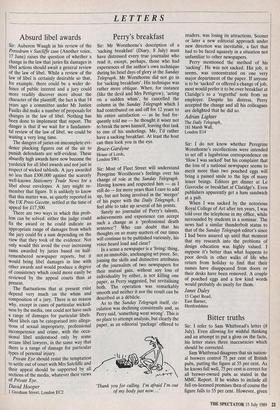LETTERS Absurd libel awards
Sir: Auberon Waugh in his review of the Pressdram v Sutcliffe case (Another voice, 17 June) raises the question of whether a change in the law that juries fix damages in libel actions should await a general review of the law of libel. While a review of the law of libel is certainly desirable so that, for example, there could be a wider de- fence of public interest and a jury could more readily discover more about the character of the plaintiff, the fact is that 14 years ago a committee under Mr Justice Faulks did make a number of proposals for changes in the law of libel. Nothing has been done to implement that report. The danger is that if we wait for a fundamen- tal review of the law of libel, we could be waiting a very long time.
The dangers of juries on imcomplete evi- dence plucking figures out of the air to punish defendants are self-evident. These absurdly high awards have now become the yardstick for all libel awards and not just in respect of wicked tabloids. A jury awarded no less than £300,000 against the scarcely well-known Stationery Trade News for a libel about envelopes. A jury might re- member that figure. It is unlikely to know that this matter was, as quietly reported in the UK Press Gazette, settled at the time of appeal for £17,500.
There are two ways in which this prob- lem can be solved: either the judge could fix the award or he could indicate an appropriate range of damages from which the jury could fix a sum depending on the view that they took of the evidence. Not only would this avoid the ever increasing sums awarded by juries based on half- remembered newspaper reports, but it would bring libel damages in line with other awards and would produce a degree of consistency which could more easily be reviewed by the appeal courts than at present.
The fluctuations that at present exist depend very much on the whim and composition of a jury. There is no reason why, except in cases of particular wicked- ness by the media, one could not have such a range of damages for particular libels. Most libels can be categorised into allega- tions of sexual impropriety, professional incompetence and crime, with the occa- sional libel understood only by some arcane libel lawyers, in the same way that there is a range of damage for particular types of personal injury. Private Eye should resist the temptation to settle out of court with Mrs Sutcliffe and their appeal should be supported by all, sections of the media, whatever their views of Private Eye.
David Hooper
1 Gresham Street, London EC2


















































 Previous page
Previous page